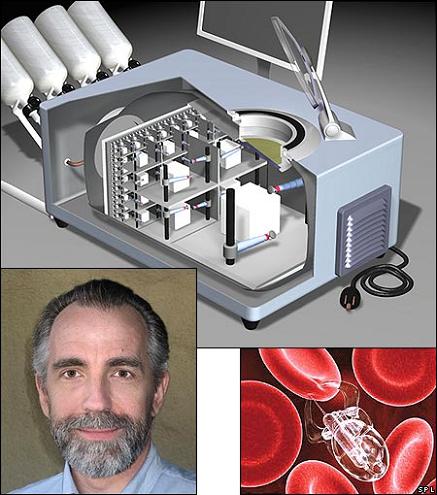In the top picture: One day nanorobot 'factories' will be installed on the personal computer. Bottom right: Nanorobots may penetrate the body and heal damaged cells. From the left: Dr. Eric Drexler
Avi Blizovsky

Direct link to this page: https://www.hayadan.org.il/graygoo.html
The scientist considered by many to be the father of nanotechnology retracted his famous statement that the nanomachines could turn the world into "gray goo". Now Dr. Eric Drexler claims that the machines that reproduce themselves at an exponential rate will not reach widespread use.
Still, in the article published in Nanotechnology magazine, Drexler emphasizes that these machines must be closely monitored to make sure they are working properly. Dr. Drexler, chairman of the Foresight Institute in Palo Alto, USA, added that when he made the statement in the XNUMXs, he did not imagine the great impact it would have on the industry. "I didn't imagine that the attempts to calm the concerns about the sticky and gray substance would lead to false denials on the part of scientists regarding the scientific feasibility" says Dr. Drexler. "I also underestimated the influence of popular science fiction stories depicting swarms of tiny nanobugs."
Dr. Drexler first brought up the idea of the sticky, gray matter in his book Engines Of Creation which was published in 1986. He described a hypothetical scenario according to which tiny nano-machines that replicate themselves and are capable of breaking down biological matter would lose control. They will multiply at a rapid rate and turn life on the universe into porridge. At the time, says Dr. Drexler, he feared that the enthusiasm for nanotechnology would overshadow the tangible risks. "I believed it was important to describe the worst-case scenario so that those involved in the field would also understand the risks, and not just the benefits," explains Dr. Drexler.
Today Dr. Drexler does not claim that this scenario is impossible and states that this "certainly does not contradict the laws of physics". In a study he published together with Chris Fenix from the CRN Center, he proposes a production model according to which nanotechnological machines could replicate themselves without fearing that the replication would get out of control. The authors add that using nanotechnology to develop new weapons would pose a much more tangible threat and that increased production of such weapons would lead to a new arms race.
The sticky, gray substance has been described in many books - including in Michael Crichton's bestseller and in the book of astronomer Martin Rees, who estimated that humanity's chances of surviving until the end of the century are 50-50. Prince Charles from Great Britain also expressed concern about the risks arising from nanotechnology.
For news at the BBC
Nanotechnology connoisseur
https://www.hayadan.org.il/BuildaGate4/general2/data_card.php?Cat=~~~867983691~~~57&SiteName=hayadan
